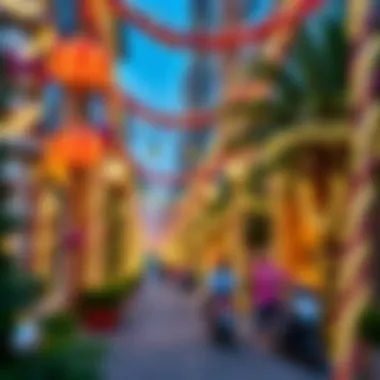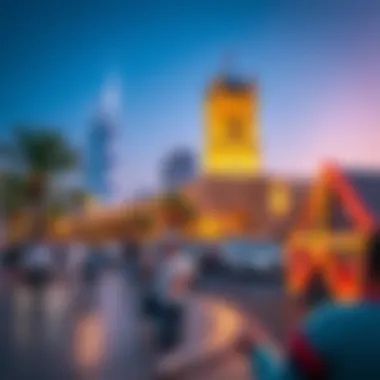Dubai Public Holidays 2024: Key Insights and Impact


Intro
Dubai's vibrant landscape, marked by its striking skyline and cultural mosaic, is not just about commerce and modernity; it thrums with the rhythm of its public holidays. In 2024, the recognition and celebration of these holidays offer a glimpse into the heart of Emirati culture and societal values. Both residents and investors alike must familiarize themselves with their significance, particularly in sectors like real estate and tourism.
Understanding the holidays gives insight into when the market might slow down or speed up. In a city known for its fast-paced life, timing is everything. The impact of these holidays extends beyond personal celebrations to influence business cycles and investment strategies, making awareness crucial for any stakeholder in the Dubai market.
Market Insights
Current Property Trends
In 2024, the property market in Dubai is looking dynamic. Many investors are closely monitoring the impact of public holidays on real estate activity. With holidays falling into different times of the year, local traditions and celebrations could lead to a genuine uptick in real estate engagements, particularly in residential areas.
During holiday seasons, families often seek new homes or vacation rentals to enjoy time off together. The festive vibe can create a sense of urgency in the market; potential buyers might find themselves motivated to invest during this period of heightened activity.
- Peak activity months during holidays include:
- Eid al-Fitr
- Eid al-Adha
- National Day
Indeed, properties outfitted for luxury experiences often see demand surge during the holiday season. Another interesting trend is the increase in the development of short-term rental units, as tourists flock to the emirate for holiday celebrations.
Investment Opportunities
As the year unfolds, savvy investors should pay attention to the opportunities presented by these public holidays. The growing trend of tourism during major festive events leads to several lucrative avenues for investment:
- Hospitality Sector: Hotels experience an influx of guests, boosting occupancy rates.
- Retail Sector: Shopping malls and local markets thrive, presenting opportunities for new businesses.
- Event Spaces: Venue rentals for holiday events or tourism-related activities can be quite profitable.
With strategic planning and by leveraging these seasonal opportunities, investors can increase their portfolio's value and tap into the emotional drivers that come with celebratory times. Also, it can't be overlooked how local businesses flourish around these holidays, creating a ripple effect in the real estate domain as well.
"The pulse of Dubai's real estate market is intricately tied to the rhythm of its public holidays, making awareness an invaluable tool for investment strategies."
For anyone looking to dig deeper into the specifics, understanding how these factors interplay with national celebrations can really set a path toward successful investments in what is already one of the world’s most dynamic property markets.
Preface to Dubai Public Holidays
Understanding the public holidays in Dubai for 2024 is crucial for a range of audiences. For investors, homeowners, real estate agents, tenants, and developers, these holidays can impact various sectors including real estate, tourism, and retail. Knowing when these days land and their significance fosters better planning and strategic moves.
Significance of Public Holidays
Public holidays in Dubai carry a weight beyond just a day off from work. They represent cultural values, religious beliefs, and communal identity. These periods serve as a time for families to gather, and for communities to come together and partake in festive activities. In the context of the UAE, which is a melting pot of cultures, public holidays also facilitate greater understanding and interaction among diverse nationalities. For businesses, understanding these holidays is key to navigating market dynamics; adjustments may be needed in operations, staffing, and inventory ahead of these dates.
For example, during key holidays, consumer behavior shifts significantly. There’s often a surge in certain sectors such as hospitality and retail. This presents both challenges and opportunities that require thoughtful response from stakeholders in the economy. Failing to acknowledge the significance of holidays can lead to missed chances and pitfalls for unwary investors and businesses alike.
Overview of the Holiday Calendar
As we delve into the holiday calendar for 2024, specific dates and their corresponding observances offer a framework for planning. Public holidays in Dubai include fixed dates like New Year’s Day, as well as holidays determined by the lunar Islamic calendar, such as Eid al-Fitr and Eid al-Adha. Following the phases of the moon can sometimes lead to last-minute changes in holiday timings, which is essential for anyone making plans around these dates.
This fluidity can influence travel arrangements, business strategies, and even personal events. Here's an overview of how the Dubai public holiday calendar typically unfolds:
- January 1: New Year's Day
- The dates for Islamic holidays: Vary annually based on moon sighting, including significant events like Eid al-Fitr and Eid al-Adha.
By keeping an eye on the holiday calendar, stakeholders can also better prepare for fluctuations in real estate engagements and community activities. An understanding of these dynamics can lead to enhanced planning and informed decisions throughout the year.
Major Holidays in Dubai
Understanding the major holidays in Dubai is crucial for anyone engaging with the city, whether for business, leisure, or cultural exploration. These holidays are not just days off; they symbolize deep-rooted traditions, communal activities, and are essential to understanding local practices. The influences of these holidays ripple through various industries, affecting business operations and lifestyle decisions. Investors and residents alike need to grasp the significance of these celebrations to navigate the social and economic landscape effectively.


New Year's Day
New Year’s Day in Dubai is a popularly celebrated occasion, drawing in both local residents and visitors. The atmosphere during this day buzzes with anticipation as people reflect on the past year while looking forward to new beginnings. The celebrations often kick off with community events hosted across the city, encouraging unity and festive spirit.
Eid al-Fitr
A pivotal moment in the Islamic calendar, Eid al-Fitr marks the end of Ramadan and is observed with great enthusiasm in Dubai.
Cultural Observances
Cultural observances during Eid al-Fitr hold significant meaning. The fasting month leading up to Eid culminates in this joyful celebration, showcasing a strong sense of community. Families gather, people dress in their finest clothes, and acts of charity are at the heart of the observance. It is not just a festive occasion; it embodies values of reflection, gratitude, and compassion. A unique feature is the communal prayers held at mosques, where thousands come together, demonstrating solidarity.
Public Celebrations
Public celebrations during Eid al-Fitr transform Dubai’s landscapes into vibrant hubs of activity. Events range from lavish feasts to public concerts, each offering a taste of Emirati culture. This festive spirit draws in tourists, boosting local economies. Although the buzzing crowds can make getting around a bit tricky, the joy and excitement surrounding these events offer unmatched experiences that showcase the emirate’s rich traditions.
Impact on Businesses
The impact of Eid al-Fitr on businesses is twofold. Many companies see a surge in sales as families tend to shop extensively for new clothing, gifts, and food to celebrate. Restaurants and hotels experience a boom, filling up with reservations as everyone wants to partake in dining out after a month of fasting. Yet, it’s also worth noting that some businesses may close for a few days, affecting operations, but generally, the overall economic impact is positive during this holiday season.
Arafat Day and Eid al-Adha
Arafat Day holds immense religious significance, being the day before Eid al-Adha. It is a day of reflection for many, making it crucial in the public holiday calendar. On the next day, Eid al-Adha is celebrated with prayers, gatherings, and acts of charity.
Religious Practices
Religious practices on Arafat Day include fasting, prayer, and reflection. Many choose to ascend Mount Arafat spiritually by participating in prayers and asking for forgiveness. This day exemplifies the faith and piety of the community, marking one of the holiest periods in the Islamic calendar. The unique custom of sharing meat from sacrificed animals with those in need reflects the community’s commitment to charity, emphasizing empathy and generosity.
Traditional Festivities
The traditional festivities surrounding Eid al-Adha intertwine religious observance with cultural celebration. Families gather to share meals, often consisting of dishes rich in flavor and communal spirit. Special events like cultural festivals occur, showcasing a blend of music and art reflecting the Emirati identity. The vibrant atmosphere is palpable, yet it’s essential to plan travel accordingly, as roads can be crowded during these celebrations.
Prophet Muhammad’s Birthday
The birthday of the Prophet Muhammad is observed with deep respect and reverence in Dubai. This day, known as Mawlid, serves as a reminder of the teachings and values the Prophet imparted, accentuating the communal aspect of faith.
Commemoration Day
Commemoration Day honors the sacrifices made by Emirati soldiers. It is a solemn day steeped in patriotism where individuals pay their respects. Ceremonies are held across the city to recognize their bravery, fostering a sense of pride in the nation’s heritage.
UAE National Day
UAE National Day is a day bursting with national pride and celebrations across Dubai. As the nation celebrates its unification, the mood is exuberant.
Fireworks Displays
Fireworks displays are a hallmark of UAE National Day celebrations. These dazzling shows light up the night skies, drawing crowds to witness this spectacular display. The unique aspect of these performances is how they often incorporate national colors and themes, symbolizing unity and pride. However, securing a good viewing spot can sometimes be a challenge due to high attendance, so early planning is essential.
Parades and Celebrations
Parades filling the streets echo the spirit of national pride. Various forms of artistic expression showcase the nation’s culture, including traditional dances and art displays. These festivities not only highlight cultural richness but also boost tourism. However, visitors should anticipate road closures and crowded areas, as many engage in the celebrations.
Holiday Dates and Observations
Understanding Holiday Dates and Observations is crucial for both residents and investors in Dubai. This section delves into the specific holiday calendar for 2024, providing insights into the importance of these dates in relation to cultural practices, economic activities, and daily routines. Knowing the timing of public holidays allows individuals and businesses to plan accordingly, ensuring that they optimize time off, align business strategies, and engage meaningfully with community events.
Holiday Calendar for


The Holiday Calendar for 2024 outlines the key public holidays celebrated in Dubai. This year, highlighted dates include:
- January 1 – New Year’s Day
- April 10 – Eid al-Fitr
- June 27 – Arafat Day
- June 28 – Eid al-Adha
- September 27 – Prophet Muhammad’s Birthday
- November 30 – Commemoration Day
- December 2 – UAE National Day
These holidays mark significant events that reflect the heritage and traditions of Dubai. For investors and property owners, coordinating with these dates ensures smooth operations, as many sectors, especially real estate, experience varying levels of activity during these times.
Adjustments to Dates
Holidays can sometimes shift, depending on celestial occurrences and government decisions. Adjustments to Dates captures how these factors influence the holiday calendar, affecting both resident plans and business operations.
Government Announcements
One aspect that plays a vital role in date adjustments is Government Announcements. The local government periodically releases updates that can shift holiday observances based on national considerations or religious factors. Each year, the government assesses the landscape and makes announcements regarding the structure of holidays, drawing on communal feedback and evolving practices.
A key characterisitc here is its adaptability. By being flexible with dates, the government can align holidays with significant communal sentiments, reaffirming the nation’s commitment to its cultural values.
This flexibility is a beneficial choice as it allows residents and businesses time to adjust their activities accordingly and can enhance public participation in celebrations. However, a disadvantage mentioned often is the uncertainty this brings; leading to potential disruptions in business planning and personal arrangements, if announcements occur last minute.
Moon Sightings
Another crucial factor is Moon Sightings, which particularly impacts Islamic holidays like Eid al-Fitr and Eid al-Adha. These dates depend on the lunar calendar, meaning that the actual celebration days are confirmed only upon sighting the moon. This requires both a traditional and scientific approach, combining local expertise with astronomical calculations.
The uniqueness of Moon Sightings lies in its rootedness in community involvement. Residents often await confirmation via local mosques or news outlets, stirring excitement in the community. Its advantage includes fostering a deep within the culture, as each sighting brings people together in anticipation. However, this practice also creates a certain level of uncertainty about when holidays will officially begin, which can affect travel plans or business operations, as they might need to adjust to last minute notifications.
In summary, the Holiday Dates and Observations section combines practical insights with cultural significance, allowing readers to make informed decisions during the public holidays of 2024. Understanding these elements can lead to better engagement with both the festivities and economic activities throughout the year.
Public Holiday Impact on Real Estate
Public holidays in Dubai have multifaceted impacts on the local real estate market. Given that these holidays meld cultural celebrations with opportunities for leisure and commerce, they often provoke short-term shifts in market activities and long-term implications for property values and investment strategies. Understanding these influences is vital for investors, homeowners, and real estate professionals navigating this dynamic landscape.
Market Dynamics During Holidays
The market in Dubai exhibits unique behaviors during public holidays. Generally, there is a noticeable dip in real estate activity as many businesses close and residents take time off to celebrate. However, the hospitality and tourism sectors often experience enhanced activity during these times, reflecting increased foot traffic and demand for short-term rentals.
- Demand Spike: During holidays like Eid al-Fitr and UAE National Day, many residents and tourists flock to the city. This surge can lead to increased demand for hotels, serviced apartments, and short-term rental units, resulting in higher rental yields for property investors.
- Sales Fluctuations: Conversely, property viewings and transactions may slow down as buyers and sellers take a backseat to holiday festivities. Those interested in purchasing might also delay decisions until after the holidays, creating a brief but noticeable lull in sales activity.
Real estate agents and developers often prepare for these fluctuations by strategically timing their marketing campaigns. For instance, launching special promotions or open house events aligned with holiday celebrations can entice potential buyers who are in a festive mood. This approach not only maintains engagement but also sustains the momentum that might otherwise diminish during holiday periods.
Investment Opportunities
Strategically leveraging public holidays can open up lucrative avenues for investment within the real estate sector. While these holidays may cause immediate disruptions, they also present unique investment scenarios worth considering.
- Vacation Rentals: With the influx of tourists during holidays, investing in short-term vacation rentals could yield substantial returns. Properties in prime locations are particularly sought after during festive periods, leading to potential rental income that can dwarf typical year-round rates.
- Commercial Real Estate: Assessing commercial properties can also be advantageous during holidays, especially as businesses capitalize on seasonal fluctuations in consumer demand. Retail spaces near shopping districts thrive as holidays prompt an uptick in consumer spending.
- Urban Development Projects: Real estate developers may find opportunities in launching projects that align with upcoming public holidays. Creating community spaces or family-oriented developments can attract potential buyers who are looking for properties that offer a blend of lifestyle and convenience.
Overall, recognizing the intricate relationship between public holidays and real estate dynamics paves the way for informed decisions. By adapting strategies to align with these cyclical changes, investors can mitigate risks and utilize holiday effects to their advantage.
As public holidays entwine with cultural significance, they also play a pivotal role in shaping the real estate landscape in Dubai.
Cultural Observance and Traditions
Cultural observances and traditions play a pivotal role in shaping the holiday experience in Dubai. They act as a bridge, connecting the present with the rich heritage of the UAE while honoring the diversity of its population. Understanding these cultural aspects can enrich the holiday experience for residents and visitors alike, allowing them to appreciate the deeper meanings behind each celebration.
Cultural Significance
The cultural significance of public holidays in Dubai transcends mere days off from work. Each holiday carries historical weight, reflecting the values and beliefs of the local population. For example, Eid al-Fitr marks the end of Ramadan, a time of fasting and reflection for Muslims. This holiday serves as a reminder of charity, unity, and gratitude, embodying the spirit of the community. Moreover, observances like the Prophet Muhammad’s Birthday foster a sense of communal identity, reinforcing the shared morals and traditions that bind the people together.
These attributes contribute not just to religious observance but also to social cohesion, as individuals from various backgrounds come together in celebration. As a result, these moments not only restore spiritual ties but also forge connections across cultural lines, enhancing the multicultural tapestry that Dubai embraces.
Festive Activities
Food Traditions


Food traditions during holidays in Dubai are nothing short of a feast for the senses. Every celebration comes with a unique culinary experience, often drawing on flavors and recipes that have been passed down through generations. For instance, during Eid al-Fitr, the tables are laden with dishes like maamoul and harees, which hold a special spot in the traditional menu.
These distinctive dishes not only satiate hunger but also symbolize hospitality and generosity, essential qualities within Emirati culture. The act of breaking bread together fosters community spirit, encouraging family gatherings and friendships. The diversity in culinary offerings also presents a great opportunity for tourists and expatriates to taste the essence of local culture, making food an engaging way to soak in traditions.
However, the challenge with food traditions lies in balancing authenticity with modern dietary preferences. As people become more health-conscious, incorporating healthy versions of these traditional meals can be a prudent maneuver.
Community Engagement
Community engagement during public holidays in Dubai reflects the willingness of its citizens to participate actively in celebrations, fostering an atmosphere of inclusivity. Events are often organized that bring people from all walks of life together, such as street fairs, parades, and cultural displays.
The key characteristic of community engagement is its ability to unite individuals, permitting them to partake in something larger than themselves. This interaction serves to strengthen local bonds and promote mutual respect among differing cultures. Additionally, participation in these events can lead to the discovery of new friendships and alliances, which are particularly beneficial for newcomers to Dubai.
However, organizing such large events can present logistical challenges, including traffic management and adequate facilities to accommodate a diverse crowd. Nonetheless, the ongoing effort to create these communal experiences greatly enhances the cultural richness of Dubai's public holidays, making the celebrations not only memorable but also meaningful.
Engaging with various aspects of cultural observance in Dubai brings both enjoyment and understanding to the broader implications of these public holidays.
With this knowledge, investors and homeowners alike can appreciate the underlying values that shape the tenure of life in Dubai, lending to a more meaningful interaction with the local culture.
Challenges and Considerations
As Dubai gears up for its public holidays in 2024, it’s crucial to consider the challenges that these days can bring. Understanding this aspect not only allows individuals and businesses to prepare but also contributes to a smoother experience during what can be an otherwise festive yet tumultuous time.
Business Disruptions
Public holidays can bring about significant changes in the business landscape. Many companies may suspend operations, leading to disrupted workflows. For investors and real estate agents, the timing of these holidays might affect transactions and negotiations. It’s vital to recognize that during holidays, not all businesses operate at full capacity. Sometimes, there’s a skeleton crew when many workers take vacation, and this could delay processes.
Businesses in retail or hospitality might experience a spike in activity as people head out to celebrate. However, logistical issues can arise, such as supply chain delays or difficulty in staffing.
Key Points:
- Retail Boom: Many businesses experience increased patronage during holidays, especially in shopping districts.
- Operational Limitations: Some sectors slow down, impacting schedules that require urgent decisions.
- Transaction Delays: For those investing in real estate, deal closures may be postponed due to holiday schedules.
Staying ahead of these potential disruptions can provide a competitive edge, allowing businesses to adapt and make informed decisions.
Traffic and Travel Modifications
Another consideration during public holidays in Dubai concerns transportation. Local traffic patterns shift as residents and tourists alike flock to celebrate. Major roads leading to tourist attractions or event venues often experience bottlenecks. It’s not uncommon for travel times to double during peak holiday hours.
Public transportation might offer limited services during holidays, and you’d need to factor this into your planning whether you’re attending a gathering or commuting. For residents, planning commutes around these times can help avoid the frustration of stuck traffic.
Factors to Consider:
- Road Congestion: Main thoroughfares to malls or festivals see a surge in vehicle numbers, demanding patience from drivers.
- Altered Transport Services: Check schedules in advance, as some public transport may operate on a reduced timetable.
- Crowd Management: Certain events may implement crowd control measures, impacting entry times and mobility.
In summary, assessing these challenges allows inhabitants and investors to navigate the complexities of holidays strategically. The ability to foresee operational disruptions and traffic changes will not only ease the daily grind but also enhance market positioning during these impactful days.
The End and Future Insights
As we draw our comprehensive overview to a close, the significance of public holidays in Dubai cannot be overstated. They're not mere days off from work; they’re rich in cultural meaning and economic impact, offering a window into the local traditions and community ethos that shape the city. Understanding these holidays aids investors, homeowners, real estate agents, tenants, and developers alike in navigating both the social and economic landscapes of Dubai.
Key Considerations
With the public holiday dates officially set for 2024, it's crucial to consider how they intersect with business operations and consumer behavior. Each holiday comes with its distinct celebrations, but they also introduce pauses in standard business activities. For instance, during Eid al-Fitr, many shops will close early, affecting everything from supply chains to retail strategies.
"The fabric of Dubai’s economy is intricately woven with the threads of its public holidays, impacting everything from tourism rates to real estate transactions."
The cyclical nature of these holidays should be taken into account when formulating long-term strategies for investment. Often, we see a spike in real estate interest around festive periods, as families look to upgrade or settle down before the holidays. Understanding these trends can provide noteworthy insights into when to market properties or plan developments.
Looking Ahead
Peering into 2025, we can anticipate that the heartbeat of Dubai will continue to pulse around its holidays. It's expected that the city will adapt further, perhaps adopting new holiday observances that celebrate its increasing diversity. This potential shift makes it critical for investors and stakeholders to remain agile and informed. By keeping one ear to the ground and another on the calendar, one can leverage opportunities as they arise, whether they be in tourism, cultural exchanges, or real estate markets.
Ultimately, by deeply understanding the cultural and economic ramifications of the public holidays in Dubai, one can better navigate its vibrant, dynamic landscape well into the future. As we look ahead to 2025 and beyond, the opportunity exists not only to participate in this thriving market but also to anticipate its evolution during these pivotal moments throughout the year.















